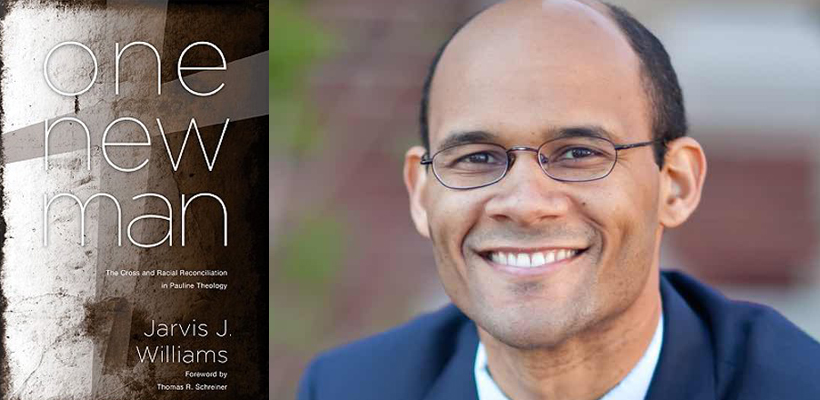Ephesians 2.11-22 is one of my favorite passages in Scripture. It's one of the passages that most inspires me to pursue the unique and beautiful Kingdom of God that transforms the world. It's also one of the clearest passages in the Bible regarding racial reconciliation—a subject about which I am very passionate. So, naturally, when I saw the title of Jarvis J. Williams' book, I was excited to read it. I was also interested because I deduced from the book's endorsements and Williams' online faculty bio that he is a Neo-Calvinist. As a highly critical opponent of that movement, I hoped that Williams could break my stereotypes and surprise me with thinking on racial reconciliation that doesn't toe the party line. Unfortunately, my hopes were thoroughly dashed and I was deeply disappointed. In this critical review, I will attempt to relate all the ways One New Man did not live up to its billing, nor adequately address the subject of racial reconciliation. An exhaustive recounting may very well be beyond the scope of this review, but I will nevertheless endeavor to highlight the most important ways this book fails.
1. D. A. Carson and Douglas J. Moo, An Introduction to the New Testament (Zondervan, 2005), p.32-33. See also: Douglas J. Moo, Encountering the Book of Romans (Baker, 2002), p.36-37. 2. Ben Witherington III, Conflict & Community in Corinth (Eerdmans, 1995), p.24-25. 3. Gordon Fee, Paul, the Spirit, and the People of God (Baker, 1996), p.70. 4. Rodney Stark, The Rise of Christianity (Harper One, 1996), p.49-71. 5. "John Piper: I Was a Racist" [http://www.christianitytoday.com/ct/2011/septemberweb-only/john-piper-racism-bloodlines-excerpt.html?start=6]
What the Book is Actually About
The subtitle of One New Man is "The Cross and Racial Reconciliation in Pauline Theology." A more accurate subtitle would have been "Superimposing the Classic Reformed Doctrine of Penal Substitution on the Subject of Racial Reconciliation." One might presume, with a title like One New Man, Williams would focus his analysis of Paul's atonement theology on that which is expressed in the immediate context of Eph. 2.11-22, but that one would be wrong. Instead, Williams rehearses the classic Reformed doctrine of Penal Substitution, hobbled together from "an examination of Rom 3:24-26; 5:6-11; 8:1-4; 1 Cor 11:23-26; 2 Cor 5:14-21; Gal 1:4; 3:10-14; and selected texts from Ephesians 1-2 and Colossians 1-2."(p.63) This broad survey of texts allows Williams to read his preferred atonement theory into the passage which is the subject of the book, rather than letting the text tells us what it chooses. Nowhere in Eph. 2.11-22 can be found any thought of God's wrath being satisfied, nor Jesus being a scapegoat. Quite the opposite in fact. The atonement metaphor Paul employs in this passage is one of reconciliation—those far off being brought near, and foreigners receiving citizenship in God's Kingdom. Considering the author sets out to write a book on racial reconciliation, one might reason that using the reconciliation atonement metaphors Paul employs within that very same passage would be wise and insightful. Williams would seem to disagree. He ignores Paul's conceptual framework for how and why the cross brings about racial reconciliation and substitutes his own view which he received from his particular religious tradition. The result is nothing less than a sales pitch for Calvinism. It's then no wonder the book engenders glowing endorsements from a 'who's who' list of popular Calvinist authors like Moo, Ware, and Anyabwile. In the introduction, Williams writes that the aim of One New Man is: "to provide Christians with a biblical view of race and race relations."(p.2) However, it's difficult to imagine how Williams thinks he's accomplished this task considering he doesn't:- Define "race" at any point in the book
- Point out that "race" is a sociological construct that is foreign to the biblical text
- Define "racism" at any point in the book
"…very few, if any, Jews..."?
Williams obviously loves Koine Greek and ancient Hebrew. He takes every opportunity in this book to show his readers how much he knows (as long as it supports his Calvinist conclusions). Apparently, this is what his Reformed readers what to see: Lots and lots of Greek and Hebrew words on every page. This tells them the author is right, even if they are wrong. (At some point, I will finally write about the magical belief evangelicals have in biblical languages.) This Bible Code approach to theology is ultimately pointless since an exegete cannot approach the original languages in a vacuum. By divorcing dead languages from their historical, cultural contexts, one only assures that one's presuppositions will meet no opposition. And this is precisely what happens in One New Man. Williams completely ignores the historical context of Romans, Galatians, or any of the other Pauline epistles from which he builds his argument for Penal Substitution, and substitutes (see what I did there) his own revisionist history that suits his Reformed presuppositions. This jaw-dropping nugget of ostrich-in-the-sand revisionism literally made me laugh out loud:"…all of the churches that Paul established were Gentile congregations with very few, if any, Jews in them." (p.135)For Calvinism, perhaps it's best to think of Jesus and Paul as Greek philosophers transported without remainder from the classical age of Athens into first-century Palestine. Certainly Judaism and the Hebraic worldview can have nothing to do with Jesus or Paul's conceptions of faith and God. Certainly their God is the static, 'uncaused Cause' of Aristotle, the 'still point' of Plato. Right? I scarcely know how Williams arrives at this conclusion. So much internal evidence points to the presence of Jewish Christians in the New Testament, to reference it all would be a daunting task. But perhaps it is enough to merely point out that even Williams' Calvinist mentors D. A. Carson and Douglas Moo take it as a given that Jewish Christians made up "most" of the early church.[1] Additionally, Ben Witherington III finds that evidence of Jewish Christians at Corinth is "clear" [2] and Gordon Fee writes:
"Homogeneous churches lie totally outside Paul's frame of reference. After all, such churches cannot maintain the unity of the Spirit that either Ephesians 2 and 4 or 1 Corinithians 12 call for."[3]Perhaps most damning of all is Rodney Stark's thesis that,
"…not only was it the Jews of the diaspora who provided the initial growth during the first and early second centuries, but that Jews continued as a significant source of Christian converts until at least as late as the fourth century…"[4]It's not entirely clear to me what Williams stands to gain from claiming that Paul's churches had a dearth of Jews, accept that it appears Calvinism significantly benefits from a more Greco-Roman approach to theology than a Jewish one. The more we can divorce Jesus and Paul from their Jewish heritage and contexts, the more persuasive the Calvinist conception of God becomes. When one realizes how fundamentally relational was the Jewish conception of God Jesus and Paul both shared, one can't imagine them endorsing the aloof and vindictive God of Calvinism.
The Politics of Calvinists Writing Books on Racial Reconciliation
As John Piper's 2011 book Bloodlines thoroughly demonstrates, the Neo-Calvinist movement in the U.S. will only engage in the racial reconciliation discussion if it affords them the opportunity to shred a 'Social Gospel' Straw Man they refer to by describing the intentionally seeking of ethnic diversity. In an excerpt of his book for Christianity Today, Piper writes,"I believe that the gospel—the good news of Christ crucified in our place to remove the wrath of God and provide forgiveness of sins and power for sanctification—is our only hope for the kind of racial diversity and harmony that ultimately matters. If we abandon the fullness of the gospel to make racial and ethnic diversity quicker or easier, we create a mere shadow of the kingdom, an imitation. And we lose the one thing that can bring about Christ-exalting diversity and harmony. Any other kind is an alluring snare. For what does it profit a man if he gains complete diversity and loses his own soul?"[5]For Piper and Williams, intentionally seeking diversity in the local church is the enemy of their gospel—which is actually Neo-Calvinism. The only diversity or racial reconciliation that counts for them is the kind that emerges from assimilation of minorities to their theological hegemony. Women and ethnic minorities are welcome at Piper and Williams' churches—so long as they are Calvinists and don't expect to be leaders. They are welcome, but Piper and Williams will expend no energy seeking them out. Setting the stage for Piper's book, Williams establishes the "ethnic diversity" Straw Man with an argument that amounts to an accusation of reverse racism. He condemns the practice of Christian organizations intentionally seeking leadership who are persons of color or female, and declares that churches don't need to be ethnically diverse to practice racial reconciliation. Williams' diversity Straw Man, however, leads him to some contradictory conclusions. On the one hand, he wants to maintain his opposition to any intentionality when it comes to diversity by calling it "favoritism" and "discrimination." (p.135) But one page later he encourages congregations to "pray about practical ways they can live out the reconciling power of the gospel."(p.136) Apparently, Williams' ideal congregation would be ethnically homogenous (so as not to show favoritism to minorities), but really good at "praying about" racial reconciliation. I'm afraid we already have far too many of these churches—and their only purpose is to protect the status quo. Intentionally seeking to form a diverse congregation is very nearly the only way we can ever hope to live out racial reconciliation. Without racial diversity, there can be no reconciliation. Unless, as it appears, "racial reconciliation" is entirely theoretical for Williams and Piper.
Conclusion
One New Man fails at its own goal of providing Christians with a "biblical view of race and race relations," instead surprising readers with a direct pitch for a Neo-Calvinist conception of human nature and atonement. Far from inspiring readers to pursue racial reconciliation, One New Man seems content to suggest a theoretical model accomplished by affirming the author's particular doctrinal commitments. I would highly recommend those interested in a Christian view of race and race relations seek insight somewhere else.1. D. A. Carson and Douglas J. Moo, An Introduction to the New Testament (Zondervan, 2005), p.32-33. See also: Douglas J. Moo, Encountering the Book of Romans (Baker, 2002), p.36-37. 2. Ben Witherington III, Conflict & Community in Corinth (Eerdmans, 1995), p.24-25. 3. Gordon Fee, Paul, the Spirit, and the People of God (Baker, 1996), p.70. 4. Rodney Stark, The Rise of Christianity (Harper One, 1996), p.49-71. 5. "John Piper: I Was a Racist" [http://www.christianitytoday.com/ct/2011/septemberweb-only/john-piper-racism-bloodlines-excerpt.html?start=6]


